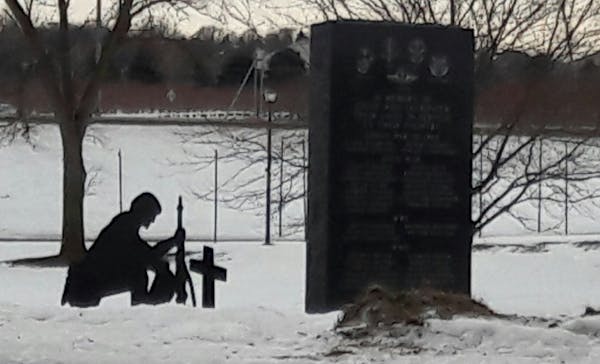The people of Belle Plaine, Minn., only wanted to honor fallen veterans of war.
Now, they will have to accommodate Satanists, too.
That's the unintended consequence of a small-town saga over free speech, and it all began when someone complained about having a religious symbol on public property.
The symbol in this case was a modest but poignant 2-foot steel war memorial called "Joe," which features a cross in its tribute to soldiers in Belle Plaine's Veterans Memorial Park.
City leaders, fearing a lawsuit rooted in the constitutional separation of church and state, in January ordered the removal of the cross.
But more than 100 residents rallied to restore the full memorial. To defuse the turmoil, the city then decided to designate a small area in the park as a "free speech zone," open to 10 or fewer temporary memorials, as long as they honor veterans.
The cross was reinstalled on the monument this month. And it's about to have company: The Satanic Temple in Salem, Mass., is planning to erect its own memorial: A black cube, inscribed with inverted pentagrams and crowned by an upturned helmet.
"Everyone understood this could happen," said Belle Plaine resident Andy Parrish, who led the charge to restore the cross. "It's more annoying than it is offensive."
In Belle Plaine, a town of 6,700 about 45 miles southwest of Minneapolis, the original decision to remove the cross proved deeply unpopular. For nearly a month, flag-toting protesters occupied the park each day, often staking their own handmade crosses into the ground out of defiance. Almost overnight, small wooden crosses popped up in business windows, on mailboxes and front lawns.
"The residents feel a sense of duty," Parrish told an overflow crowd at a February City Council meeting. "Our veterans defended us and it's our duty to defend them."
City officials decided that night to authorize the public forum on park grounds. Councilman Ben Stier wondered aloud if the change would be worth it to veterans if they had to share their parcel with, say, a satanic group. They answered with a reluctant yes.
The Satanic Temple was first in line to test their resolve.
Reason Alliance, the Temple's nonprofit fundraising arm, said it filed an application to erect a memorial to honor nonreligious service members. Founder Doug Mesner said the group does not worship Satan, but instead aims to "encourage reason and empathy, reject tyrannical authority and promote justice" while seeking equity for nonbelievers. Their proposed monument would include an inscription honoring Belle Plaine veterans "who fought to defend the United States and its Constitution."
City Administrator Mike Votca said the memorial met all of the town's requirements and was swiftly approved.
"Nothing is bulletproof, that's for sure," Votca said of the limited public forum policy. "But I think it's as fair as it can be, which is really what we're trying to achieve to eliminate the chance of lawsuits."
Mesner said his group had been prepared to sue if its proposal was denied. He predicts that public forums will become an increasingly popular compromise to avert such lawsuits.
"It's a sad state of affairs when any one religious group feels persecuted because they don't have exclusive privilege on the public grounds," Mesner said.
Standing firm
Some Belle Plaine residents considered the city's initial decision to remove the cross an insult to veterans who had fought and died for their country. They have accused groups like the Freedom From Religion Foundation and the Satanic Temple of preying on small towns that lack the resources to fight back. They repeatedly argued that the cross on the Joe memorial was not intended as a crucifix, but rather, as individual expression similar to a grave marker.
That's a difficult case to make, said First Amendment lawyer Jane Kirtley, because a cross evokes a "universal meaning of Christianity."
Even when speech is favorable to a majority — as the cross appeared to be in predominantly Christian Belle Plaine — the state cannot impose that view on others, said Kirtley, director of the University of Minnesota's Silha Center for the Study of Media Ethics and Law.
Public cemeteries are treated differently, Kirtley said, because religious symbols carved onto individual grave markers are treated as individual expression — not government speech — which is protected by the Constitution.
The Freedom From Religion Foundation has no objection to religious insignia on headstones, said Rebecca Markert, an attorney with the organization. But it does object to religious monuments on other public property.
"These types of monuments are popping up all over the country," said Markert, who called the Belle Plaine case an "egregious violation." She questioned the constitutionality of the city's decision to establish a limited public forum in the park so the memorial could be restored, and said the foundation may submit its own "Atheists in Foxholes" monument.
Katie Novotny, a vocal cross proponent, said the majority of residents have accepted the idea of a monument that includes satanic symbols.
"If you're truly a Christian, how can you be offended by someone wanting to honor our veterans even though they don't believe in the same things we believe in?" she said.
Liz Sawyer • 612-673-4648

Minnesota State Patrol celebrates diverse new class of troopers

Fired Mpls. teacher accuses management of 'cancerous rot'

Jill Biden rallies women, teachers for the Biden-Harris ticket in Bloomington speeches
Neighbors, city officials at odds over Rochester lake dam

